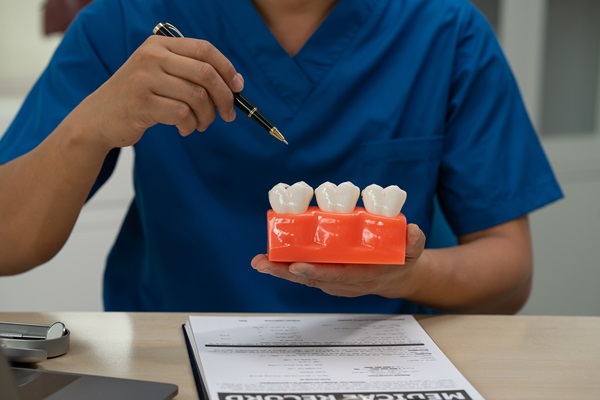Root Canal Therapy for a Tooth Infection

Wondering whether root canal therapy is in your near future? The only way to know is to make an appointment with a general dentist for a full oral evaluation. While most dental patients know they have a problem tooth, not all tooth infections cause pain.
About tooth infections
A tooth infection occurs when bacteria are able to get inside of a tooth. Some of the more common reasons why someone would experience a tooth infection is because they have been diagnosed with severe tooth decay, gum disease or have a chip or crack in a tooth, which allows the bacteria to enter. Once a dentist officially diagnoses a patient with a tooth infection, the next step is scheduling an appointment to undergo root canal therapy.
The root canal procedure
A root canal procedure is used to save a tooth that is severely decayed or has become infected. The information below allows those who are in need of root canal therapy to understand the procedure they will need to undergo in order to repair their infected tooth. Most root canal treatments require a patient to make two separate appointments.
Oral evaluation, X-rays
The first thing a dentist will do is perform a complete mouth evaluation on the patient and take necessary X-rays. X-rays allow a dentist to see the shape of the root canals, as well as understand whether the infection has already affected the surrounding bone. The importance of this first step should not be underrated, as this information tells a dentist exactly what is needed in order to address the patient's tooth infection. Once the dentist understands how to properly and efficiently treat the tooth, it is time to move on to the next step.
Local anesthesia to numb the area
Next, patients will be given local anesthesia so they will not feel any discomfort or pain while the root canal procedure is being performed. Since there are a few different options for numbing the area around the tooth, patients can discuss their options with their dentist in order to understand which option is ideal for them. Once the area is completely numbed, the actual root canal procedure can begin.
A small hole is drilled in the tooth
The last part of root canal therapy requires a dentist to make an access hole in the tooth, as this allows them to remove the infection. This means removing all of the pulp within the tooth as well as the tooth’s nerves to ensure that all of the infection is addressed. It is also necessary to treat all of the canals of each root of the tooth, which requires a dentist to clean, shape and disinfect all of the canals. Once the infection is removed from all of the root canals, a special dental material is used to seal the tooth.
Root canal therapy saves teeth
Once a tooth becomes infected, the infection will only continue to worsen until the infection is removed. Root canal procedures are typically both safe and painless, allowing those who are living with an infected tooth to keep the tooth in their mouth, which is always preferred.
Request an appointment here: https://clearcreekdentistry.net or call Clear Creek Dentistry at (360) 692-6332 for an appointment in our Silverdale office.
Check out what others are saying about our dental services on Yelp: Root Canal Treatment in Silverdale, WA.
Recent Posts
Thinking you need to undergo a root canal to save one of your teeth? A general dentist is the type of dental professional who typically performs this type of oral surgery often. The fact that root canal therapy is necessary to save an infected tooth makes it a good idea for patients to learn more…
Restorative dentistry is common practice for many patients during their dental appointments. Maintaining a healthy relationship with your dentist is one of the most beneficial practices you can establish to maintain proper oral hygiene. Your smile says a lot about you, and it is often the first feature noticed when you meet someone new. Everyone should…
Looking to understand the difference between a dental inlay and a regular filling? Dental inlays are one of many restoration options that general dentists offer patients who are suffering from a damaged tooth. Another common option is a dental filling, which has varying characteristics but offers a similar outcome.Long ago, there were very limited options…
Traditionally,dental restorations require an individual to have a physical impression of their mouth taken. Impressions are necessary to accurately create an indirect dental restoration, which are restoration made outside of the oral cavity and applied at a later time. Dental crowns, veneers, inlays and onlays are all examples of restorations that require impressions in order to…


